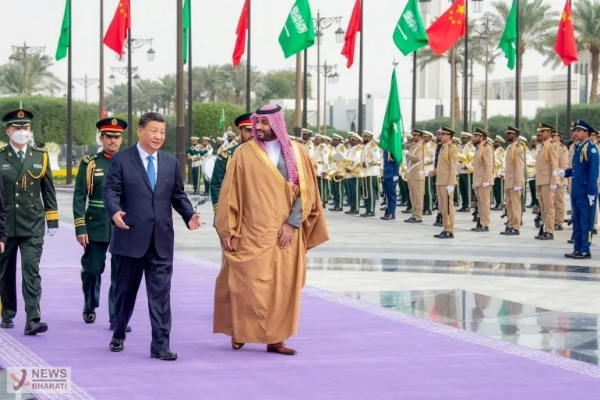China’s New Arabian Diplomacy
This visit has provided many indicators to prove that Saudi Arabia has gained significant focus in its foreign policy calculus in the last few years and thus, being dubbed as a ‘game-changing event’ in Chinese media.
Total Views |
As soon as China’s President Xi Jinping gained historic authority at the 20th Party Congress, he resumed his foreign visits which had almost paused during the last three years. Following the visit to Southeast Asia in November for G20 and other regional conferences, his next visit to Saudi Arabia was recently concluded on December 10th.

This visit has provided many indicators to prove that Saudi Arabia has gained significant focus in its foreign policy calculus in the last few years and thus, being dubbed as a ‘game-changing event’ in Chinese media.
Also Read: Internet Censorship Regime in China
During his talks with crown prince Mohammad Bin Salman, Xi specifically mentioned the significance of Saudi Arabia in China’s West Asia diplomacy. Conversely, China has also become a major partner for Saudi Arabia since its relations with the US have strained over issues like the killing of Khashoggi and recent differences over oil production in light of sanctions on Russian oil. It was evident from the pomp and grandeur with which Xi Jinping was received in Riyadh, something which was reserved earlier only for the US Presidents. He was greeted with an escort by fighter jets, a royal guard contingent, an honorary doctoral degree from Saudi’s topmost university, and digital signboards on Riyadh’s streets welcoming Xi. This was in sharp contrast to the nominal reception accorded to Joe Biden in July this year. Although symbolic, it goes on to indicate Saudi’s changing perception of China - keeping aside the issue of Uyghurs and catering to more important core interests. In fact, China’s role will be crucial in achieving Saudi’s Vision-2030 project which aims to reduce dependency on oil exports amid a positive shift towards clean energy sources globally. Despite the western narrative of this visit such as - China's “steps on Washington’s toes” or China’s promotion of an “alternative to western-led security order”, it will be wrong to entirely view China-Saudi relations through the prism of Saudi relations with the US. China is Saudi’s largest trading partner with total trade reaching US$ 87 billion in 2021. Due to large oil imports from Saudi Arabia, China has a substantial trade deficit with Saudi Arabia. Before Russia became China’s largest oil supplier in 2022 owing to cheaper prices of Russian oil amidst sanctions, Saudi enjoyed this status for the past many years. Moreover, Saudi Aramco has also invested US$ 10 billion in a petrochemical complex in China’s north-eastern Liaoning province along with several other investments to assist China’s energy supplies. In the military sector, China Electronics Technology Group has signed a deal to supply UAVs to Saudi Arabia in its fight against Houthis and Iran, thus gradually diminishing USA’s military role in the region. In addition to this, the recent visit of Xi concluded 34 investment agreements worth over US$ 30 billion in diverse fields ranging from green energy to infrastructure development. For instance, controversial Huawei has signed a deal for building cloud data computing and high-tech facilities in Saudi. This can jeopardize Saudi Arabia’s data security in the future. Other deals in sectors like renewable energy, logistics, transportation, etc will also boost China’s Belt and Road Initiative in Arab countries. More importantly, China signed a comprehensive strategic partnership deal with Saudi Arabia which shows growing levels of trust between these two countries. Similarly, the growing response to Xi’s call to use the Chinese Yuan to settle energy trade can also have a significant impact on the Dollar hegemony. Both countries have also agreed to jointly provide the necessary support for African and Arabian countries struggling to revive in the post-pandemic period. Saudi Arabia’s capital and China’s technological investments are capable of providing greater support to these underdeveloped countries in difficult times. This way, China can also achieve a significant expansion of the Belt and Road Initiative with Saudi Arabia as a reliable partner. China is already the largest investor and trading partner in Africa and now with Saudi’s backing, it will be able to bypass the fears of a debt trap created by Chinese investments. Apart from this, China’s soft power in the region is also on the rise in the last few years. The recent data shows that 4 Arab countries have agreed to introduce the Chinese language in their education system along with 20 Confucius Institutes and 2 independent Confucius classrooms in 13 countries.
However, despite all the signs of deepened relationship, Saudi’s cautious approach towards China is evident from its foreign minister prince Faisal Bin Farhan’s clarification after the conclusion of Xi’s visit that “deepening of relations with China did not mean the Kingdom was turning its back on the US and other Western allies”. This is largely due to Saudi’s need for Western allies in its fight against Iran and non-state actors in West Asia and more so, due to China’s unpredictable nature in global politics. Further, China’s closeness to Iran during Western sanctions also acts as a major hurdle in strengthening its relations with other Arab countries. Thus, it is still a distant dream for China to replace the USA as a net security provider in West Asia despite its efforts to enter this domain by supplying modern weaponry like UAVs. However, the 1st China-Arab summit attended by Xi Jinping along with his presence at the China-Gulf Cooperation Council summit is some of the indicators for China’s new diplomacy in Arab countries. It will be interesting to see how other countries in the region react to it along with their long-time partner USA.


